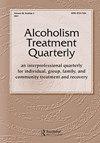治疗难治性酒精使用障碍
IF 0.9
Q4 SUBSTANCE ABUSE
引用次数: 0
摘要
摘要尽管现有的干预措施对酒精使用障碍(AUD)患者显示出一定的前景,但仍有相当多的患者对治疗无效或无法完成治疗。在目前的研究中,我们分析了治疗发作数据集(TEDS)的数据,以创建表明谁更有可能像往常一样抗拒治疗的档案。在分析中,使用卡方和逻辑回归将个人特征与治疗耐药性的高风险和低风险联系起来。使某人像往常一样抵抗治疗的风险更高的特征包括失业、无家可归(或依赖性生活安排)、日常使用、男性以及同时发生的精神和药物滥用障碍。研究结果表明,患者入院时的一般人口统计信息可用于确定常规AUD治疗策略可能不足的人群。因此,这些发现可以帮助告知、塑造和个性化治疗,为那些不会从典型的AUD干预中受益的个体亚组带来成功的结果。本文章由计算机程序翻译,如有差异,请以英文原文为准。
Treatment Resistant Alcohol Use Disorder
ABSTRACT Despite existing interventions that have shown some promise for people with alcohol use disorder (AUD), there is a sizable number of patients that fail to respond to or complete treatment. In the current study, we analyzed data from the Treatment Episode Data Set (TEDS) to create profiles that indicate who may be more likely to resist treatment-as-usual. For the analysis, chi-square and logistic regression were used to associate personal characteristics with being at high and low risk of treatment resistance. Characteristics that put someone at higher risk of resisting treatment-as-usual include being unemployed, homelessness (or a dependent living arrangement), using daily, being male, and co-occurring mental and substance abuse disorders. The results suggest that general demographic information at patients’ admission can be used to identify population groups where conventional strategies for standard AUD treatment may be insufficient. As such, the findings can help to inform, shape, and personalize treatment, leading to successful outcomes for the subgroup of individuals who will not benefit from typical AUD interventions.
求助全文
通过发布文献求助,成功后即可免费获取论文全文。
去求助
来源期刊

Alcoholism Treatment Quarterly
SUBSTANCE ABUSE-
CiteScore
1.60
自引率
11.10%
发文量
31
期刊介绍:
Alcoholism Treatment Quarterly is an exciting professional journal for clinicians working with persons who are alcoholic and their families. Designed to bridge the gap between research journals and information for the general public, it addresses the specific concerns of professional alcoholism counselors, social workers, psychologists, physicians, clergy, nurses, employee assistance professionals, and others who provide direct services to persons who are alcoholic. The journal features articles specifically related to the treatment of alcoholism, highlighting new and innovative approaches to care, describing clinical problems and solutions, and detailing practical, unique approaches to intervention and therapy.
 求助内容:
求助内容: 应助结果提醒方式:
应助结果提醒方式:


